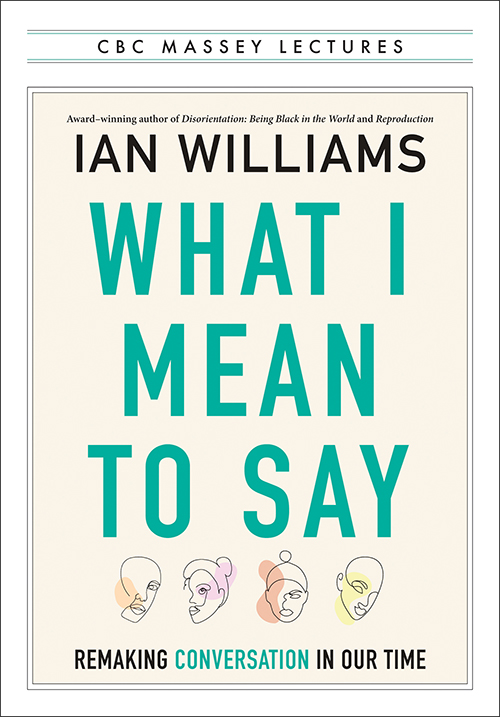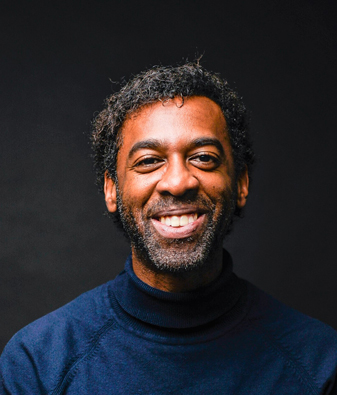Can we talk? Ian Williams believes we’ve forgotten how. We’ve lost our ability to have constructive, respectful and meaningful conversations.
“But I think we can recover it,” says Williams, a professor with the Faculty of Arts & Science’s Department of English, and the director of the department’s creative writing program.
Published last month, Williams’ new book, What I Mean to Say is the basis for his recent 2024 CBC Massey Lectures that allowed Williams the chance to travel coast to coast to discuss how to restore the lost art of conversation — both face to face and online.
“The book emerged from seeing the decline in how we talk to each other,” says Williams. “Our conversation is functional, brief and kind of hostile. This is how our leaders talk to each other and how many of us talk to each other online. Some of our friendships are getting flattened into an online space or a text message.

“And so I’m responding to this decline, which for me is really a problem with how we see each other. It's symptomatic of a flattening of complexity in how we see other people. The purpose of this book is to try to rehabilitate our conversations.”
The book’s chapters cover William’s experiences with personal conversations and public conversations with examples of dialogue throughout. But it’s not a how-to guide for talking about difficult topics, says Williams.
“The book doesn't give a treatment on how to talk about race, gender or sexuality these days,” he says. “It's really about how to relate to each other.”
Looking at the conflicts and crises people have faced, he’s not shocked our conversation skills have deteriorated.
“In the last five years we went through Black Lives Matter and an explosion of violence in the States,” he says. “Then we had the pandemic, now we have a series of ongoing wars that we haven't seen since the middle of the 20th century. We're all feeling beaten down.”
The COVID pandemic took a significant toll on conversation quality.
“It's understandable that polite speech would disappear when there was a real chance that we could have died from speaking to a stranger,” says Williams. “And so our rhetoric became shrill and urgent — every man for himself.
“Remember those empty shelves? Remember getting toilet paper? That all led to this panicked, high-pitched conversation. And because things went on for so long, and because crisis after crisis followed, we never returned to a resting heartbeat.”
What’s needed, he feels, are deliberate efforts not to normalize this way of communicating.
We need to be honest with each other, but also accept honesty.
“We shouldn’t just see another person as a threat to our ability to get food, or to our view of what the nation should be like,” he says. “More than ever, conversation requires a diplomacy to work with each other, to cooperate rather than compete.”
Add to this charged atmosphere the ever-increasing reliance on digital communication where people share their thoughts in a few characters and often remain anonymous.
“Social media planted itself during the pandemic,” he says. “We needed it to communicate with each other, but I don’t think it invites us to share the best version of ourselves.”
What I Mean to Say includes several suggestions to improve conversation quality. One concept Williams supports is adjusting what we think of other people before we speak.

“We should assume the best of each other,” he says. “We shouldn't assume that people are our enemies. It could be that you’re wrong, but it’s better to err on that side than to start off with the idea that this person has hostile motivations towards you.”
He also recommends honesty and truth over politeness and suggests we develop thicker skin.
“We need to be honest with each other, but also accept honesty,” he says. “If someone said to me, ‘you could lose a couple of pounds,’ or ‘that doesn't look good on you,’ I should be able to accept those things if I recognize, ‘Okay, there's some truth in it.’
“The comment may not make me feel good. But I should be able to accept what this person is saying is not malicious; in fact, they’re trying to give me information to make me better. We need to be able to handle truth.”
Going forward, Williams has three wishes for us when engaging in future chats.
Take more time to have those sprawling conversations that we had when we were in university and all the time in the world was ours. Not these functional go-in-and-extract your-gold-from-the-conversation-then-get-out talks. Let the conversation go wherever it wants. That space of exploration is where we genuinely express ourselves.
The first is to become better listeners. “Good listeners give something to the conversation, an energy that brings out the best in your partner,” he says. “When you listen, you can really inhabit other people’s perspectives. The best writers who write dialogue well, like novelist Zadie Smith, have talked about how important listening is to them.”
The second wish is to have conversations free of time limits.
“Take more time to have those sprawling conversations that we had when we were in university and all the time in the world was ours,” he says. “Not these functional go-in-and-extract your-gold-from-the-conversation-then-get-out talks. Let the conversation go wherever it wants. That space of exploration is where we genuinely express ourselves.”
Williams’ last wish is for us to stop being so quick to cancel each other because of a single statement or position.
“I’m talking about a space where people can say crazy things and be forgiven, so that there's a space of understanding that this person may have said something terrible, sure, but that doesn’t represent the totality of who they are,” he says.
“The fact that they've said it indicates something about their past, their upbringing, their values. They're not always solely responsible for forming these ideas. And so rather than cutting them out like a tumor and moving forward, we have the option to forgive. I know that’s a big ask.”
Though abrupt, combative conversations surround us, Williams is convinced we still have the patience and capacity to return to conversing in a sincere, open and thoughtful way.
“We haven't lost it completely. It's still within working memory.”


